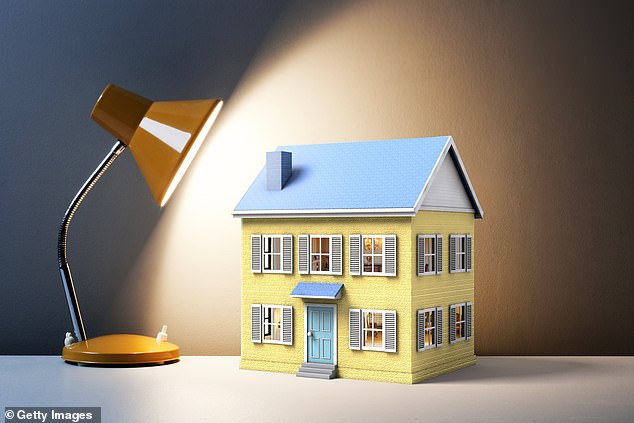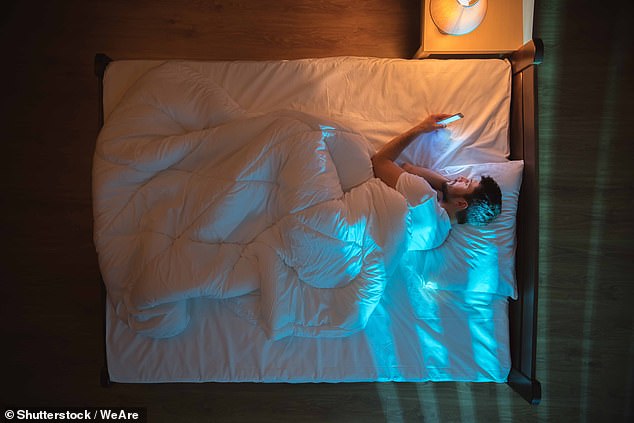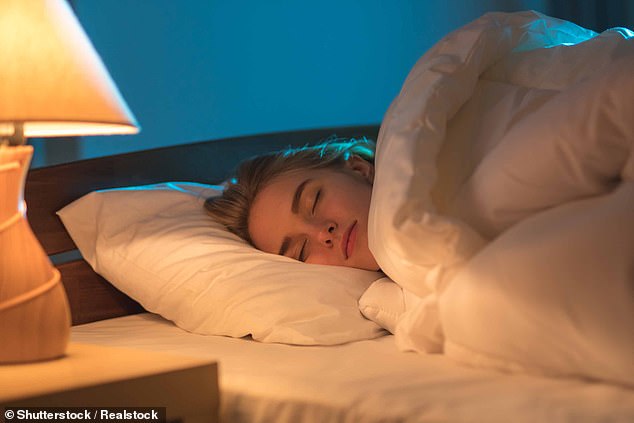How indoor lights can leave you suffering ‘JET LAG’: A bright home can trick your body clock and leave you feeling tired and groggy, experts say
- Sleep is needed to recover, mentally and physically, from daily life
- Bright light has direct effect on alertness, it’s like drinking several cups of coffee
- Average adult goes to bed at 11.15pm but gets just six hours 35 minutes’ sleep
For centuries, sleep was regarded as a time when nothing really happened, something with which you could dispense. It is an attitude that continues today: ‘Don’t sleep any more than you have to,’ advised Donald Trump in his 2004 book Think Like A Billionaire, claiming to sleep for only four hours a night himself.
Among sleep scientists, though, there is a growing consensus that getting enough shut-eye is fundamental to our ability to learn and regulate our emotions. And lack of sleep doesn’t just leave us feeling groggy and irritable — chronic sleep deprivation is emerging as a major cause of ill-health, from type 2 diabetes to cancer.
The fact is, we need sleep to recover, mentally and physically, from daily life and our body clocks are central to this recovery.

Among sleep scientists, though, there is a growing consensus that getting enough shut-eye is fundamental to our ability to learn and regulate our emotions (file picture)
As I explained last week in Good Health, there is a biological clock ticking in every cell of your body. The normal working of the brain, immunity and bodily functions such as heart rate and digestion are all controlled by these.
The clocks respond to signals from a ‘master’ body clock, a patch of your brain that keeps them synchronised with each other and with the time of day, according to cues it receives from a set of light-responsive cells at the back of the eyes.
The clocks trigger various biochemical reactions at different times of day.
For instance, scientists recently discovered that, while we sleep, a system flushes out toxins that accumulate in the brain during the day, such as beta-amyloid protein, which is associated with the development of Alzheimer’s.
Night-time — and sleep — is also important for laying down new memories. These processes are less efficient when we are awake.
Humans have evolved to synchronise sleep with when it’s dark outside.
The problem is that those same light-sensitive cells in the back of the eye also respond to artificial light, such as that from electric bulbs and screens.
Being exposed to bright light at night has significant effects.
First, it delays the timing of our master body clock and suppresses melatonin, the hormone released at night that helps trigger sleep.
This means we feel tired later and fall asleep later — and, as we still have to get up for work the next morning, we get less sleep overall.
As our body clocks have been pushed later, it also means our body’s natural daily low point in mood and alertness, which is biologically programmed to occur before dawn when we’re asleep, occurs when we’re awake instead.
Is this why you sleep so badly?
It’s not just indoor light that causes problems. A 2016 study found that people living in areas with elevated levels of light pollution — from LED street lights — tend to go to bed and wake up later than those living in darker areas.
They also sleep less, feel more tired during the day and are less satisfied with the quality of their slumber.
Bright light also has a direct effect on alertness — it’s like drinking several cups of coffee.
When we’re exposed to it at night, our heart rate and core body temperature increase. Usually, these are at their lowest during the night.
It is thought to affect other important processes that occur at night, too, such as muscle repair and skin regeneration.
Also, because we are more active in the evenings, we often eat our largest meal of the day when we are physiologically least prepared to deal with it. Food can also shift the timing of some of our internal clocks — and, as a result of all this, our bodies become confused and no longer work as efficiently.
Shift work — and increasingly bright light at night, as well as social jet lag — has been linked to a host of conditions such as obesity, type 2 diabetes, depression and heart disease.
Some academics have even suggested artificial light, which makes it easier for us to work at night, may be the reason these conditions have risen to such epidemic proportions. And, in 2007, the International Agency for Research on Cancer added nightshift work to the official list of ‘probable’ human carcinogens.
Ban blue light at night
What would happen if we reverted to a traditional relationship with light? Kenneth Wright, an assistant professor of physiology at the University of Colorado Boulder, in the U.S., has investigated precisely that.
His studies suggest that removing artificial evening light shifts the body clock several hours earlier, so, by waking-up time, production of the night-time hormone melatonin has switched off.
With artificial light in the evening, melatonin production continued for several hours after waking.
Professor Wright suspects that this melatonin ‘hangover’ could contribute towards our feelings of grogginess in the morning.

Kenneth Wright, an assistant professor of physiology at the University of Colorado Boulder, suggest that removing artificial evening light shifts the body clock several hours earlier (file picture)
Inspired by such findings, I decided to go cold-turkey on artificial light at night myself and spend more time outdoors during the daytime. I was interested to see whether this would translate into any wider benefits.
Before, my sleep routine was fairly typical for a British person: I’d go to bed at around 11.30pm or midnight and reliably be woken up at 7.30am by my children.
Even though I slept soundly, compared with many of my countrymen — the average British adult goes to bed at 11.15pm but gets just six hours 35 minutes’ sleep a night — I often felt groggy in the mornings and would have liked to sleep for longer.
Also, like three-quarters of British adults, I had the unfortunate habit of routinely checking my smartphone just before bed, blasting myself with blue light, which inhibits melatonin and pushes the body’s clock later, potentially making it harder to get to sleep.
During the first week, I did everything I could to maximise daylight exposure: moving my desk next to a large, south-facing window, loitering in the park after school drop-offs, exercising and eating lunch outside.
Another week, I turned off the lights after 6pm, even though this meant cooking in the dark, as it was midwinter.
Computers and smartphones were banned in the evenings unless absolutely necessary and then only if they were in ‘night mode’, to reduce the amount of blue light they emitted.
During a third week, I combined both sets of interventions, keeping things bright in the day and dark at night.
To track my responses, I wore a device on my wrist that captured information on light exposure, activity and sleep. I filled in daily diaries and questionnaires to record my alertness and mood and did a battery of online tests to measure my reaction speed, attention and memory.
Finally, on the last night of each week, I sat in the dark, spitting into a tube to work out when I started releasing melatonin — that marker of internal time.
Cooking by candlelight
Overall, cooking by candlelight was a daily challenge. My pledge to avoid artificial light made socialising difficult.
Despite the challenges, I did significantly reduce the amount of light I was exposed to after sunset — and this did throw up some interesting findings. Light, or illuminance, is measured in lux, which refers to the amount of light striking a surface.
At our latitude, the full moon on a clear night is 0.1 to 0.3 lux.
During the experiment, the average illuminance in my home between 6pm and midnight was 0.5 lux — only a little brighter than moonlight.
Meanwhile, on some of the brightest, sunniest winter days, when I’d taken a cup of tea to the park and sat on a chilly bench to construct my to-do list for the day, the reading on my light meter was 73,000 lux — not far off the sort of reading you’d expect on a cloudless day in summer. Back indoors, I took another reading from the middle of my office — it was 600 times dimmer than outside.
The UK’s Health and Safety Executive recommends an average illuminance of 200 lux in most offices. A recent study found that U.S. adults spend more than half their waking hours in light even dimmer than this and only about a tenth of their time in the equivalent of outdoor light.
But did doing any of this have a measurable impact on my sleep or mental performance? During the experiment, my early morning mood was noticeably more positive. The grogginess was gone: I felt more energetic and alert.
Tests showed my body started releasing the darkness hormone melatonin one-and-a-half to two hours earlier when I cut out artificial light or got more daylight.
I also felt more tired before bedtime and tended to go to bed about 30 minutes earlier: I would have turned in even sooner but, in the run-up to Christmas, we often had guests to entertain.

The average British adult goes to bed at 11.15pm but gets just six hours 35 minutes’ sleep a night (file picture)
When I correlated my sleep measurements with the amount of light I was exposed to during the daytime, another interesting pattern emerged. On the brightest days, I went to bed earlier.
Because of this experience, I’m a convert to outdoor exercise and have even come to look forward to certain aspects of winter — particularly the bright, frosty days and spectacular sunsets.
Forging a healthier relationship with light doesn’t mean that we have to ditch all our electronic gadgets. But we need to acknowledge excessive light at night and an absence of bright light during the day is harmful.
We evolved over aeons when day was day and night was night. It’s time to reconnect with that.
ADAPTED from Chasing The Sun: The New Science Of Sunlight And How It Shapes Our Bodies And Minds by Linda Geddes, published by The Wellcome Collection on January 10, 2019, at £14.99. To order a copy for £11.99 (20 per cent discount, valid until January 22, 2019), visit this website or call 0844 571 0640. P&P is free on orders over £15.
